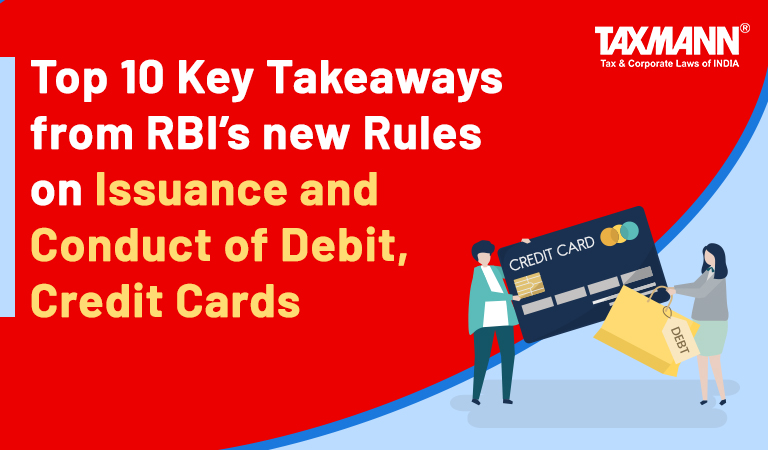Top 10 Key Takeaways from RBI’s new Rules on Issuance and Conduct of Debit, Credit Cards
- Blog|News|FEMA & Banking|
- 2 Min Read
- By Taxmann
- |
- Last Updated on 24 April, 2022

The RBI vide. Circular No. RBI/2022-23/92 DoR.AUT.REC.No.27/24.01.041/2022-23, Dated April 21, 2022, has issued new directions relating to the issuance and conduct of Credit Card and Debit Cards. The directions cover the general and conduct regulations relating to credit, debit, and co-branded cards which shall be read along with prudential, payment, and technology & cyber security-related directions applicable to credit, debit, and co-branded cards, as issued by the RBI.
The provisions of these Directions relating to debit cards shall apply to every bank operating in India. Whereas, the directions on credit cards shall apply to every Scheduled Bank and all Non-Banking Financial Companies (NBFCs) operating in India. The Directions will be effective from July 1, 2022.
This write-up aims to highlight the top 15 key takeaways from the RBI’s master direction on the issuance and conduct of Credit, and Debit cards hereunder:
1. Scheduled Banks with a Networth of Rs. 100 crores or more can only do credit card business
Now Scheduled Commercial Banks (SCBs) with a net worth of ?100 crore and above are permitted to undertake credit card business with the approval of their Boards. Regional Rural Banks (RRBs) are permitted to issue credit cards in collaboration with their sponsor bank or other banks. Financially sound and well managed Scheduled Urban Cooperative Banks (UCBs) with a minimum net worth of ?100 crore may issue Credit Cards subject to the specified conditions. However, NBFCs registered with the Reserve Bank shall not undertake credit card business without prior approval of the Reserve Bank
2. Banks to issue one-pager key fact statements along with credit card application
As per directions, the Card-issuers shall have to provide a one-page Key Fact Statement along with the credit card application containing the important aspects of the card such as rate of interest, charges, etc.
3. RBI forbids unsolicited up-gradation of credit cards
The directions prohibit credit cards issuers from issuing unsolicited cards/upgradation without the explicit consent of the customer. It further provides that any loss arising out of misuse of such unsolicited cards shall be the responsibility of the card-issuer only and the person in whose name the card has been issued shall not be held responsible for the same.
4. Banks to seek OTP based consent for activating a credit card; mandates closure if no consent is received
Card issuers shall have to seek One Time Password (OTP) based consent from the cardholder for activating a credit card if the same has not been activated by the customer for more than 30 days from the date of issuance. It further provided that If no consent is received for activating the card, card issuers shall have to close the credit card account without any cost to the customer within 7 working days from the date of seeking confirmation from the customer.
5. Banks are prohibited from sharing credit information with CIC prior to card activation
The directions prohibit Card-issuer from reporting any credit information relating to a new credit card account to Credit Information Companies prior to activation of the card. Any credit information relating to such inactivated credit cards already reported to Credit Information Companies shall be withdrawn immediately.
Click Here To Read The Complete Story
Disclaimer: The content/information published on the website is only for general information of the user and shall not be construed as legal advice. While the Taxmann has exercised reasonable efforts to ensure the veracity of information/content published, Taxmann shall be under no liability in any manner whatsoever for incorrect information, if any.

Taxmann Publications has a dedicated in-house Research & Editorial Team. This team consists of a team of Chartered Accountants, Company Secretaries, and Lawyers. This team works under the guidance and supervision of editor-in-chief Mr Rakesh Bhargava.
The Research and Editorial Team is responsible for developing reliable and accurate content for the readers. The team follows the six-sigma approach to achieve the benchmark of zero error in its publications and research platforms. The team ensures that the following publication guidelines are thoroughly followed while developing the content:
- The statutory material is obtained only from the authorized and reliable sources
- All the latest developments in the judicial and legislative fields are covered
- Prepare the analytical write-ups on current, controversial, and important issues to help the readers to understand the concept and its implications
- Every content published by Taxmann is complete, accurate and lucid
- All evidence-based statements are supported with proper reference to Section, Circular No., Notification No. or citations
- The golden rules of grammar, style and consistency are thoroughly followed
- Font and size that’s easy to read and remain consistent across all imprint and digital publications are applied



 CA | CS | CMA
CA | CS | CMA
